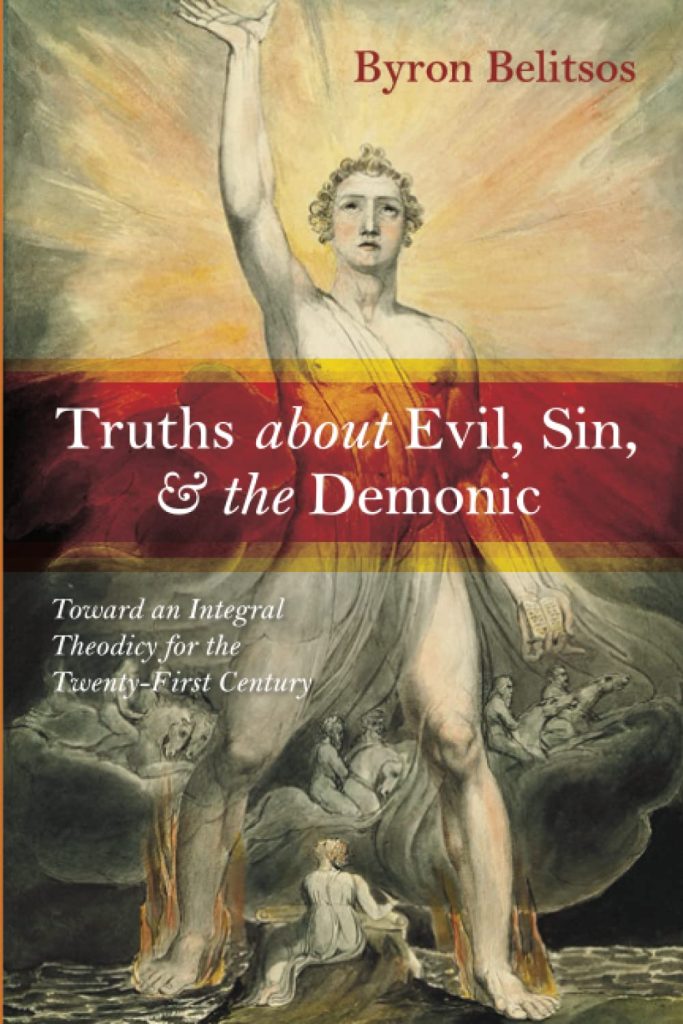
a review by Rebecca Bynum
Truths about Evil, Sin and the Demonic: Toward an Integral Theodicy for the Twenty-First Century
by Byron Belitsos
314 pages
Wipf and Stock, April 2023
Byron Belitsos’ Truths about Evil, Sin and the Demonic starts out very well and gives a clear and concise overview of the philosophic explanations for the existence of evil and its connection to free will from Augustine to Hegel with a good explanation of the Book of Job and the differences between Eastern Orthodox and the Western Christian tradition. This part of the book gets an A+ and would not be out of place in the NER Press catalogue. The book, I believe, stumbles when Belitsos brings in two relatively minor modern philosophers, John Hick and David Ray Griffin – both build on the work of Alfred North Whitehead. Hick’s work is mildly interesting involving evil as a spur for character development and soul growth, but Griffin is praised by Belitsos as a great truth-teller for embracing “9-11 Truth,” meaning the theory that the terrorist attacks of 9-11, were actually a false-flag operation perpetrated by the U.S. government for reasons never adequately explained. As this assertion undercuts the credibility of both Belitsos and Griffin, at least to my mind, I believe it should have been left aside. Belitsos then covers John Sanders’ idea that God risks evil for love – free will is a necessary aspect of love, even though freedom also allows the possibility of evil and sin and all the consequences thereof.
Belitsos weaves these many strands of thought together in order to point the way toward a more complete modern theodicy, but his method here is a bit complex and unsatisfying, especially when fitting these philosophies into Ken Wilbur’s multiple perspectives idea. I found this chapter (nine) hard to follow.
Belitsos then brings in the Urantia Book and how it revitalizes the very much older traditions of the “war in heaven” and the notion that the far-flung universe is actually run by “sons of God” who are not all-knowing and are sub-infinite, sub-absolute and more or less time- and space-bound. The Urantia Book explains how these higher beings (also blessed with free will) may, and indeed have, gone astray and rebelled against God’s plan causing untold misery and death to the creatures under their guardianship, namely, we earthlings. If this explanation is correct, it basically settles the issue of the “problem of evil” which has bedeviled theologians and laymen alike for millennia. The Urantia Book also endorses the idea that strong characters are created between the “anvil of necessity and the hammer of anguish.”
Belitsos also goes to some lengths explaining how the Urantia Book itself is not the final truth, a fact the book itself explains in several places, and so much of this section is unnecessary beyond a simple disclaimer, especially for people who are not already Urantia Book readers.
In short, for me, the first five chapters were informative, clear and well-written and worth the price of the book, but the last five chapters unfortunately get bogged down in unnecessary complexity and tangents.
Worth a look.
- Like
- Digg
- Del
- Tumblr
- VKontakte
- Buffer
- Love This
- Odnoklassniki
- Meneame
- Blogger
- Amazon
- Yahoo Mail
- Gmail
- AOL
- Newsvine
- HackerNews
- Evernote
- MySpace
- Mail.ru
- Viadeo
- Line
- Comments
- Yummly
- SMS
- Viber
- Telegram
- Subscribe
- Skype
- Facebook Messenger
- Kakao
- LiveJournal
- Yammer
- Edgar
- Fintel
- Mix
- Instapaper
- Copy Link









